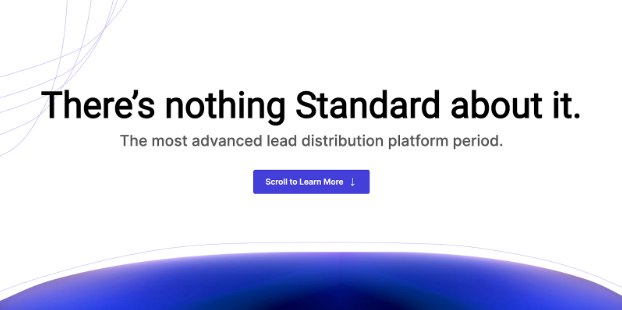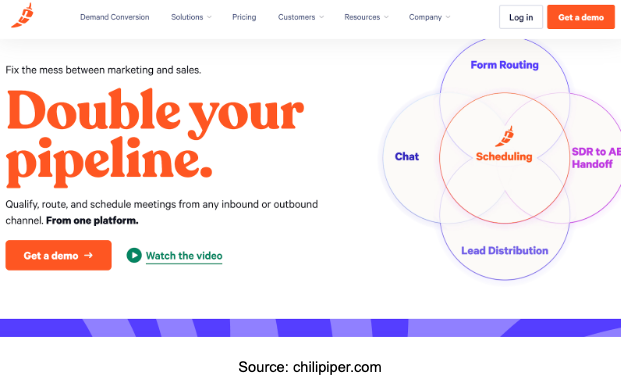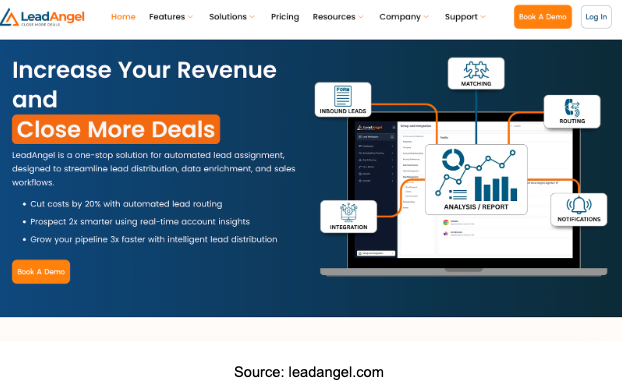Slow or manual lead assignment often costs you opportunities. When incoming leads sit in a queue or land with the wrong rep, your sales team loses time and your marketing spend goes to waste. Unqualified reps end up with leads they cannot convert, while high-potential prospects turn to competitors who respond faster.
You need lead distribution because speed and accuracy shape outcomes. Without a structured system, your business risks lower conversion rates, poor accountability, and misaligned ownership across the sales pipeline.
This guide explains what a lead distribution platform is, why it matters to your sales process, and which features to consider. It also reviews the top options in 2025 to help you find the right fit for your team.
What Is a Lead Distribution Platform?
A lead distribution platform is software that assigns incoming leads to the right sales rep or team in real time. Instead of relying on manual processes or spreadsheets, the platform ensures every new lead is captured, evaluated, and directed with precision.
Lead routing is often used as a broad term, but lead distribution goes deeper. Routing refers to the general flow of leads, while distribution defines how those leads are assigned fairly and efficiently across sales reps. The distinction matters because a structured lead distribution process improves lead quality, reduces wasted effort, and supports higher conversion rates.
A modern lead distribution system works alongside other tools rather than on its own. It connects with CRM platforms, marketing automation software, and lead management programs, unifying every lead source into a single process.
Once captured, the system applies predefined rules such as territory, lead scoring, or sales rep availability. Leads are then assigned to the right team member based on business needs. The outcome is faster engagement, accurate data, and stronger performance across the sales team.
Ready to stop losing leads to manual processes? Try Standard Information’s automated lead distribution platform.
Why Your Business Needs Lead Distribution
Sales teams depend on speed and accuracy to convert new leads into opportunities. A structured lead distribution process matches the right sales rep with the right prospect at the right time.
Without it, businesses risk wasted marketing spend, lower lead quality, and missed chances to build stronger pipelines.
- Faster response times - A lead distribution platform enables real-time lead distribution, reducing delays between capture and first contact. A quick follow-up gives your team an advantage over competitors.
- Fair assignment - Automated lead distribution strategies prevent uneven workloads. Round robin or rules-based lead distribution strategies spread opportunities across sales reps, which supports team performance and morale.
- Higher conversion rates - Assigning leads based on scoring, territory, or rep availability improves lead qualification. Sales reps can focus on high-priority leads while still keeping pace with new leads that enter the funnel.
- Improved tracking and accountability - A lead distribution system provides detailed tracking, audit trails, and reporting. Managers can monitor the lead distribution process, review lead details, and adjust routing rules to match business needs and improve sales performance.
5 Best Lead Distribution Platforms in 2025
Choosing the best lead distribution software depends on how your team handles lead volume, assignment rules, integrations with existing tools, and goals for business growth.
The following platforms represent some of the most widely used options in 2025:

The system captures incoming leads, applies predefined rules, and routes leads to the right sales reps without delay. Teams can buy and sell leads, manage auctions, and track performance in one place.
Dynamic lead routing supports real-time decisions based on territory, lead scoring, rep availability, and buyer criteria. Ping Post Appointments adds a direct path to booked meetings, returning a calendar link in 0.5 to 2 seconds during live calls.
Operations can run 24/7, which helps sales teams reach more prospects without manual handoffs.

The platform maximizes value for both buyers and sellers. Campaign-level controls manage volume caps on a daily, weekly, or monthly basis.
No-code integrations connect to existing tools in minutes, while audit logs and detailed reporting deliver visibility across the full lead distribution process.
Key features
- Ping Post and bidding - Apply rules, bid in real time, and control costs with dynamic thresholds.
- Lead validation and blocking - Reject duplicate leads by email or phone, and use blacklist controls to filter profanity or opt-outs.
- No-code integration builder - Map fields to buyer formats, customize headers, test routes, and launch quickly.
- Real-time reporting - Review transaction logs, error logs, and performance metrics to adjust routing rules with confidence.
- Custom notifications - Send SMS, email, or webhook alerts when a lead is accepted, and pass lead details to your CRM.
- Marketplace controls - Build private exchanges, set geo filters, set min and max sell prices, and align campaigns to peak hours.
- Compliance ready - FCC One-to-One support with SIT-BAC helps protect data and maintain compliant workflows.
- AI support - Amelia assists with integrations and troubleshooting, while AI management tools optimize thresholds and monitor key metrics.
Teams use Standard Information to distribute leads based on business needs, match leads to the right sales rep, and protect data accuracy across every route. Ping responses land within 1 to 3 seconds in typical auctions, which helps reduce drop-off, lift first-contact rates, and close more deals.
2. LeanData
LeanData is known for its advanced lead distribution software within Salesforce. It supports large sales teams that rely on account-based strategies and need a structured way to manage complex routing rules.

Its core strength lies in lead-to-account matching, which helps align new leads with existing accounts and improves the accuracy of assignments.
Sales teams use LeanData to create customized routing rules that reflect their sales process and distribution strategies.
With detailed reporting dashboards, managers can monitor the lead distribution process, evaluate lead quality, and refine routing rules to better align with business goals.
Key features
- Lead to account matching – Connects new leads with existing accounts for stronger accuracy
- Complex rule logic – Applies predefined rules for assigning leads based on business needs
- Account-based marketing alignment – Supports ABM strategies through detailed targeting
- Workflow automation – Automates lead assignment inside Salesforce to reduce manual steps
- Reporting dashboards – Give managers visibility into routing results and team performance
Downside
LeanData can feel overwhelming for smaller teams that do not need highly complex distribution strategies. The platform requires careful setup to make full use of its advanced features. Companies without a Salesforce-first approach may find the system less practical compared to simpler lead distribution platforms.
3. Chili Piper
Chili Piper is an automated lead distribution software that focuses on connecting prospects with sales reps through instant scheduling.

Its Distro tool powers real-time lead distribution, sending leads to the right rep based on availability, territory, or round robin rules. The Instant Booker feature allows prospects to select a meeting time right after submitting a form, helping teams reduce delays and improve lead engagement.
Sales teams use Chili Piper to create a smoother lead distribution process and reduce the time between capture and first contact.
With integrations across CRMs, calendars, and web forms, it helps sales reps qualify leads faster and convert inbound leads into booked appointments without extra steps.
Key features
- Distro tool – Routes leads instantly based on predefined rules
- Instant Booker – Lets prospects schedule meetings immediately after lead capture
- Calendar integrations – Syncs directly with team calendars for accurate scheduling
- Real-time lead distribution – Assigns leads to available reps within seconds
- Automated scheduling – Eliminates manual follow-ups by placing meetings on calendars
Downside
Chili Piper’s advanced features can create challenges for teams that prefer simple lead distribution strategies. The platform’s focus on instant scheduling may feel unnecessary for businesses that do not rely heavily on appointment booking. Smaller teams may find the range of integrations more complex than they need.
4. LeadAngel
LeadAngel is a lead distribution system designed for B2B organizations that want flexibility in routing logic.

It offers several lead distribution strategies, including round robin, weighted assignment, and territory-based rules. This allows sales teams to assign leads based on geographic location, product line, or sales rep availability, which makes it easier to match leads with the right team members.
The platform supports lead management across complex sales processes. With integrations into CRM platforms and marketing systems, LeadAngel helps teams capture leads, distribute leads, and manage assignments without relying on manual processes.
Key features
- Round robin distribution – Assigns leads evenly across sales reps to maintain balance
- Weighted lead assignment – Allocates more leads to reps with higher capacity or skill
- Territory-based routing – Matches leads to reps according to geographic location or business rules
- Lead management integration – Connects with existing tools to manage leads through the sales pipeline
- Routing rules – Apply predefined rules to create consistency across assignments
Downside
LeadAngel’s interface may feel less intuitive compared to newer lead distribution platforms. Some teams report that initial setup can require extra time to configure routing rules. Businesses with smaller sales processes may find the system more complex than they need for basic lead assignment.
5. LeadAssign
LeadAssign is designed to support dynamic lead routing through a mix of AI and traditional distribution methods. The platform evaluates incoming leads in real time and notifies sales reps based on capacity, territory, or buyer requirements.